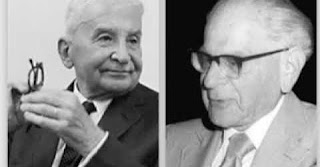I just finished reading Gordon Tullock's essay "Evolution and Human Behavior," which is included in The Selected Works of Gordon Tullock, volume 10, Economics without Frontiers, and was surprised by his omission of the idea of valuing in discussing human behavior.
As Mises and Popper pointed out (see Mises and Popper on Action), action implies a valuing—a preference for a new state that may be achieved and is hypothetically better than the current one. Tullock, ignoring this fact, asserts that his landing on the beaches of "Normandy on D plus 7" was predicted by his genes rather than his values—he was, like his fellow soldiers, "genetically programmed to fight for their tribe" (p 168).
This assertion might be plausible for tribes, as they were tightly-knit communities in which all members were organically connected to each other, if not genetically through the common struggle for survival. If one person felt pain, everyone felt pain including the chief. In this position, a threat against one was a threat against all, and the willingness to fight would have been an asset.
Fast forward thousands of years and we have the environment of the nation state. Here, outside our family, we are alone. Our tribe is dispersed, and we rely for our existence on people we do not know that live far from us. Our State hardly knows we exist, although a failure to pay our taxes my bring us to its attention. The State is not organic—when we feel pain there is no pain felt in our legislature or the departments that execute the legislation that is intended to limit our actions. In this environment, how can we be convinced to risk our lives to perpetuate our State?
The answer may be quite simple. Perhaps it is to make us dependent—to produce a situation in which we believe that all we are and all we could become is dependent on the perpetuation of the status quo in our particular state. When we combine the social services State with the welfare State we have the ingredients of a potent cocktail to mold the values of citizens to make acting against the State a mortal sin and acting in its favor is a moral duty.
Returning to Gordon Tullock, we can imagine that he was taught, as was I, that our country, the United States of America, was prosperous because of our governmental system, and that we lived in a free country. Tullock was only 7 when the Great Depression began and would have been subjected at an impressionable age to all of the New Deal propaganda and may have even benefited from some of the programs. Even though he claims in the essay that he "wasn't even enthusiastic about the war," we can imagine that when he was drafted (Levy & Pert, p. 4) to refuse would have meant prison and/or dishonor. It wasn't his genes that made him ready to kill or be killed by people he had never met who were across an ocean and thousands of miles from his home of Rockford, Illinois—it was his values.
Now, I confess, genes may have an influence on values; but Tullock, although he had read Ludwig von Mises's Human Action (three times!) (Levy & Peart, p. 4), did not first establish that action depends on values and preferences and then speculate about how those values and preferences might have been affected by our physical evolutionary history as opposed to our psychological development.
2015 Levy, D. and Peart, S., Gordon Tullock and Karl Popper: Their Correspondence
